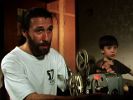Eye For Film >> Movies >> My Perestroika (2010) Film Review
It's usual to document history by examining political comings and goings, crunching down the facts of newsreel footage into understandable observations. But perhaps the most accurate document of a country's history, is its people - and it is these living, breathing windows to Russian's past 35 years that Robin Hessman examines in her fascinating and refreshingly accessible documentary.
The newsreel and Communist propaganda footage is here, but there are also equally revealing home video snippets, used to show the childhood of five Muscovite classmates, who look back on their lives since 1977 and talk about their own perestroika (restructuring) - the way everything has changed in Russia while, in a contradiction found throughout the film, an awful lot has stayed the same.

Under the Communist rule of their childhood, they would have been assigned their places in society but, as the old politics have fallen, each has forged their own path. Borya and Lyuba are a married couple, still living in the house where Borya was born, with their young, precocious son Mark. Both are former political activists who now teach at the same school #57 where they went themselves. Their musician pal, Ruslan, has retained more of a rebellious streak, once a punk band stalwart and now a busking bluesman, while Andrei has become a well-paid businessman, running a set of clothing shops. Completing the five is Olga - a single mum, for whom the violence born from the political turmoil of the country had a significant personal impact.
There is a curious brand of nostalgia here, in their philosophical considerations of the past, which is fondly remembered yet without a desire to return to it. "I was completely happy with my Soviet reality," says Lyuba, laughing with the sort of ironic humour that is a staple of all the interviews. Now teaching history, she talks about how hard it is to explain to kids today that, back in the Seventies, nothing changed year after year. There is also an acknowledgement that the rebellion of the Eighties was, at least in part, sparked by romanticism, while opposition to the 1991 coup sprang, not from any deep-seated politicisation of the populace but because there was nothing to eat in the shops.
The film is also peppered with small but incredibly insightful details, such as the fact that when huge news events are happening, such as the coup, Russians get treated to wall-to-wall Swan Lake on the TV, or the comical/sinister sight of kids of 1982 playing the game "Funeral Of Brezhnev".
Now, there is still a sense that things are in retrograde as the tagteam of Putin and Medvedev seem intent on, if not rewriting, then, at least 'adjusting' the way that history is taught in schools. "It does make me sick," says Borya "But it's not like it used to be. Back then, you not only felt sick, you wanted to die." This is not a downbeat documentary - it's a perceptive celebration of the resillience and philosophy of a generation who are keepers of the past and architects of the future, if not in the political spectrum, then by the way in which they are raising their children.
Throughout Hessman - who lived in Russia for many years - has an easy, freewheeling approach to her subjects. She captures not only them, but also the little things in their lives - a terrapin in a tank, one of the kids trying to get to grips with a computerised dance mat - and this helps to give the film a sense of immediacy and intimacy. Alla Kovgan and Garret Savage also deserve recognition for their excellent editing together of all the different pieces of footage, both past and present into a seamless and engaging whole. Another documentary gem from the incredibly strong factual line-up at Sundance 2010, which deserves to reach a much wider audience.
Reviewed on: 10 Apr 2010

















